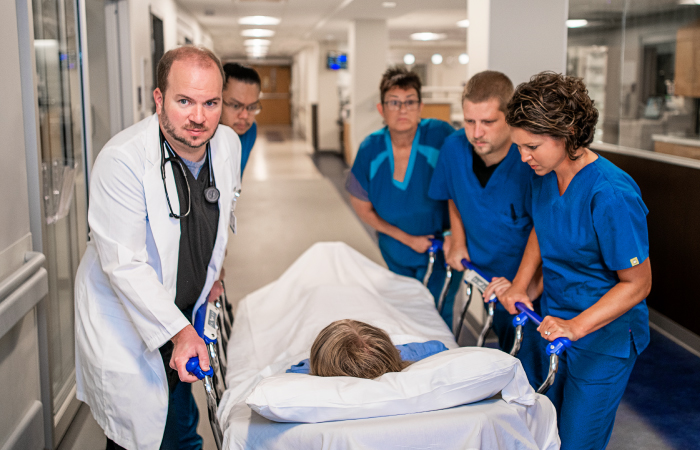Life can change in an instant. That’s why our board-certified emergency physicians are always ready. With advanced treatments and world-class cardiologists, we’re prepared for the worst – so you can count on the best care when it matters most.
Emergency & Trauma
WHEN SECONDS COUNT. At HSHS St. John’s, you will find board-certified emergency medicine physicians, registered nurses and other specially trained staff ready to treat anyone seeking emergency medical care.

Here with you when it matters most

Regional Trauma Center
As a certified Level I trauma center and a certified Level II pediatric trauma center, St. John's is prepared to provide the highest level of care for patients of all ages at a moment's notice. Our highly trained professionals provide real-time medical oversight and direction to paramedics when they're in the field treating patients and can activate trauma-specific processes. St. John's offers our community experienced surgeons 24/7, an advanced surgery center and an on-site helipad.
Trauma patients requiring follow-up can be seen in the trauma clinic. To learn more, or make arrangements, call 217-528-7541.

Air transport
When seconds count, our team of professional medics take flight to transport you to our trauma center to ensure you receive life-saving care. Aviation services are provided by Air Methods® Corporation.
Dial. Don't Drive. Call 911
Benefits of calling 9-1-1
- Treatment starts at time of call to dispatch
- Dispatch will advise initial treatment that can actually start at home
- EMS continues treatment and diagnosis on scene
- Oxygen and medications are given, EKG and blood pressure can be performed
- EMS can also revive and resuscitate a patient
- No delays driving to hospital - lights and siren
- Present to hospital for immediate medical attention
Risks of Driving Yourself
- No home assessment prior to driving to hospital
- Passenger cars have to fight the other traffic and obey traffic lights
- 1 in 300 people experiencing a heart attack die on the way to the hospital
- If the patient arrives OK, they will have to sign in, be triaged and then receive their first diagnostic treatment of EKG and blood pressure check
- Oxygen and medications are given once the patient is brought to a room
Here with you for life-saving care
Chris suffered a traumatic head injury and laid on his kitchen floor for 13 hours before he was found and rushed to HSHS St. John’s Hospital. He and his family are grateful for the expert, compassionate care that saved him and carried them through their darkest moments.